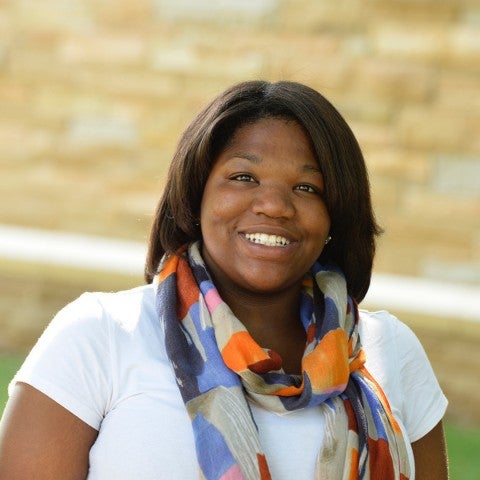| Flyer | Event Information |
|---|---|
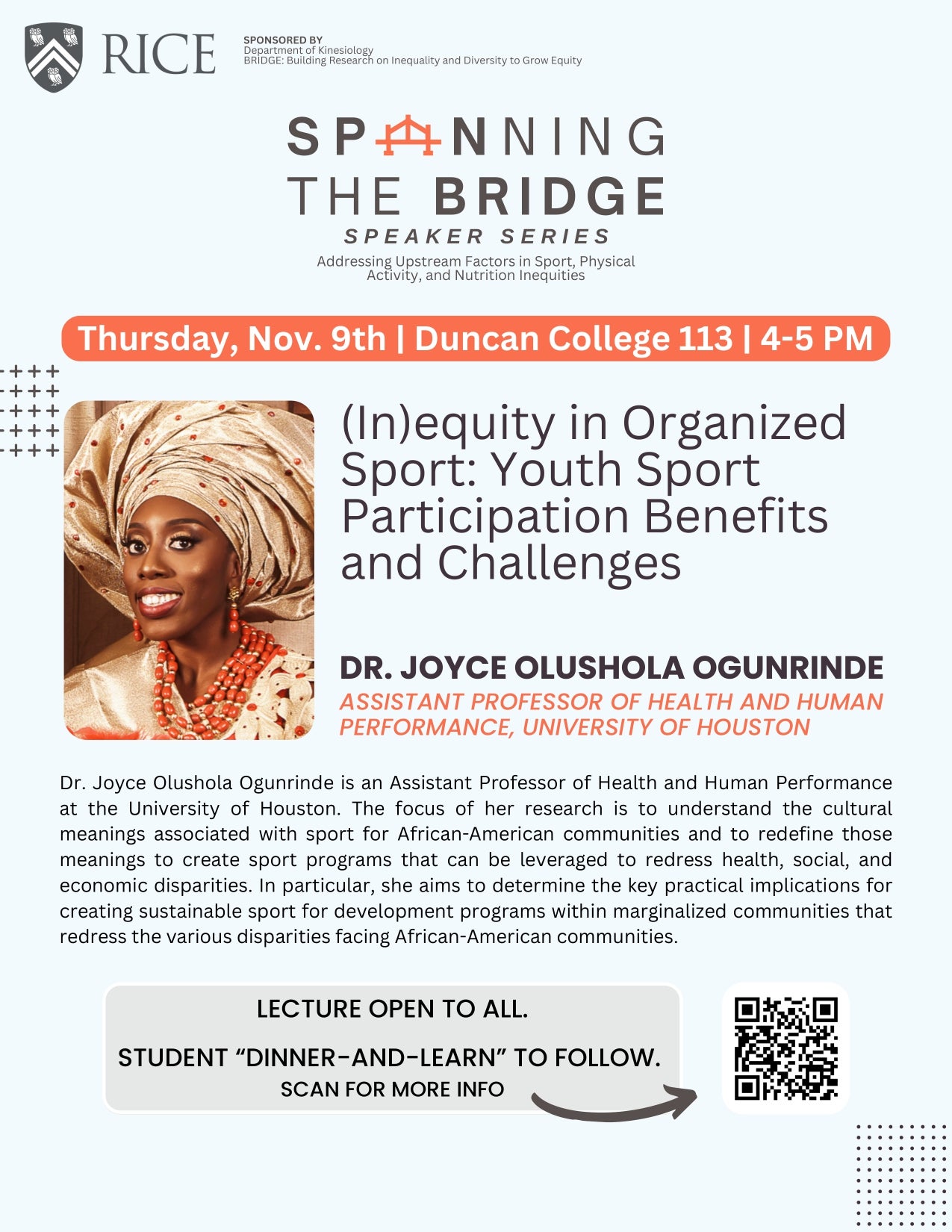 |
(In)Equity in Organized Sport: Youth Sports Participation Benefits and ChallengesThursday, November 9, 2023 Dr. Joyce Olushola Ogunrinde (University of Houston), "Inequity in Organized Sport: Youth Sports Participation Benefits and Challenges |
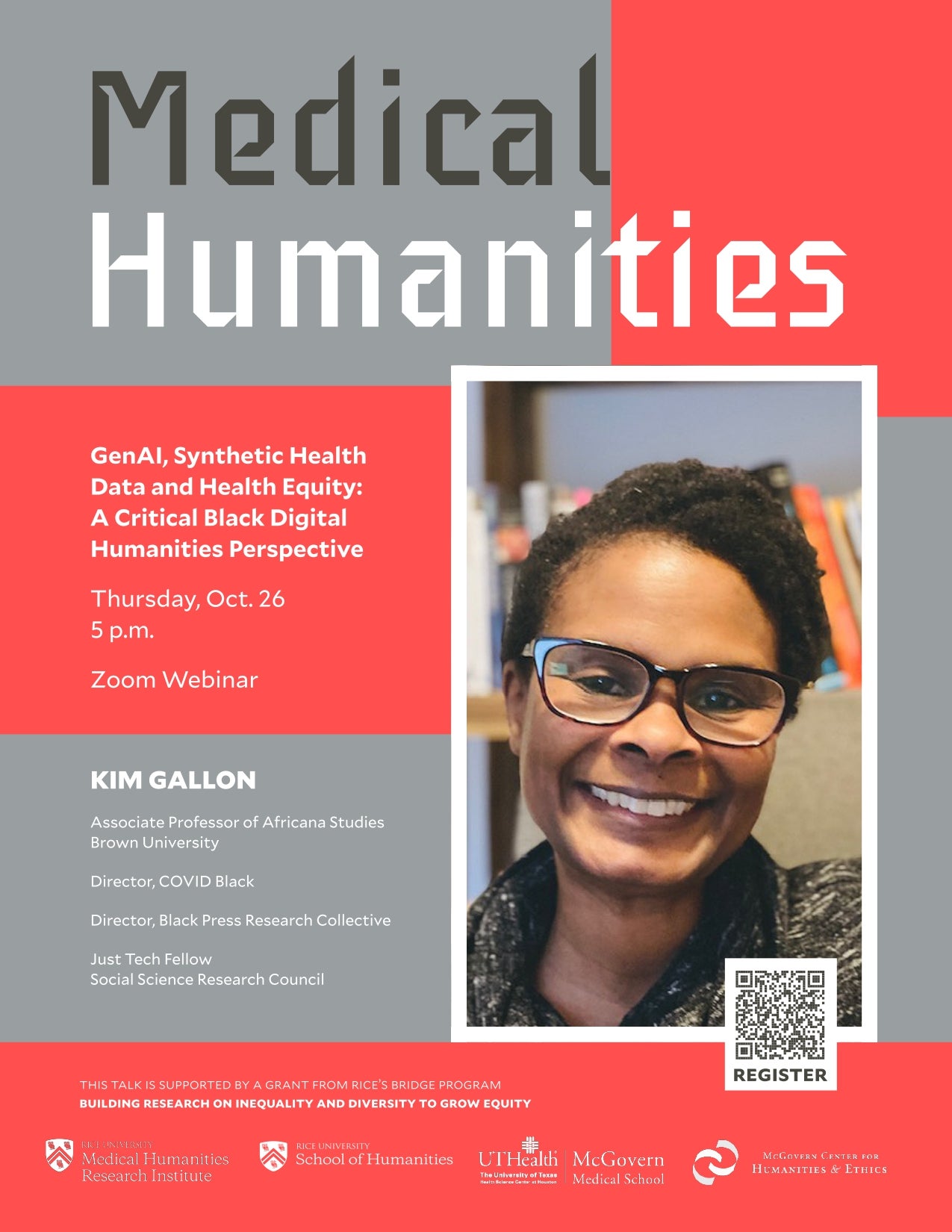 |
GenAI, Synthetic Health Data and Health Equity: A Critical Black Digital Humanities PerspectiveThursday, October 26, 2023 Dr. Kim Gallon (Brown University), “GenAI, Synthetic Health Data and Health Equity: A Critical Black Digital Humanities Perspective.” |
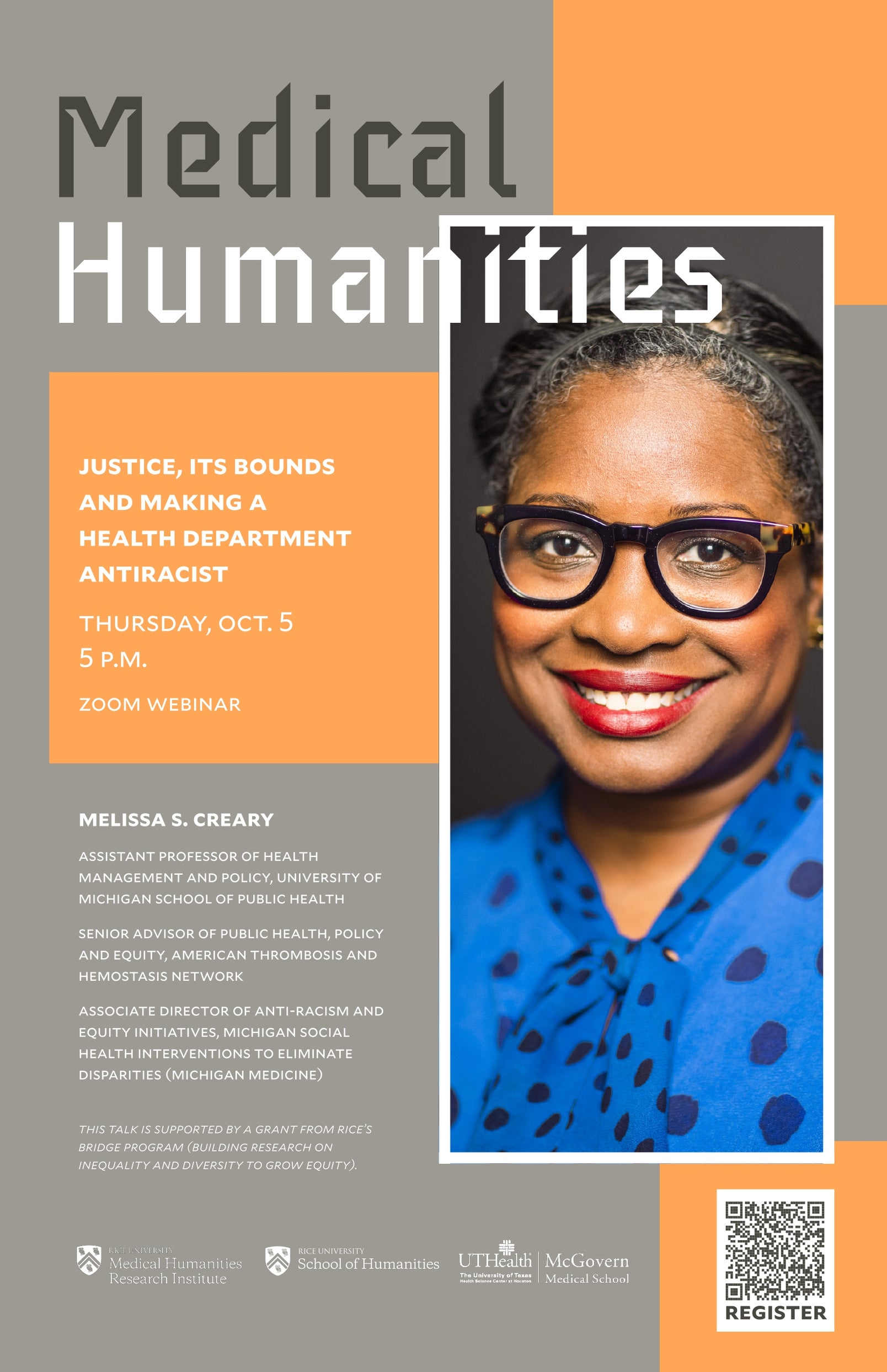 |
Justice, Its Bounds and Making a Health Department AntiracistThursday, October 5, 2023 Rice University's Medical Humanities is hosting a webinar with guest speaker Melissa Creary (University of Michigan School of Public Health) on Justice, Its Bounds and Making a Health Department Antiracist. |
 |
Toward a Racially Just Workplace" Three Zones of Action for Advancing Diversity, Equity, Inclusion and JusticeMay 12, 2021 Dr. Laura Morgan Roberts is an innovative global scholar, speaker and consultant on the science of maximizing human potential in diverse organizations and communities. Her thought leadership in diversity, authenticity and leadership development has been recognized by LinkedIn (Top 10 Voice in Equity; 2020); ThinkList #Amplify (2020), and the Academy of Management Organizational Behavior Award for Societal Impact (2020). Laura has published over fifty research articles, teaching cases, and practitioner-oriented tools for strategically activating best selves through strength-based development, workplace equity and inclusion. Laura has co-edited three books: Race, Work and Leadership (2019 Axiom Business Book Award winner); Positive Organizing in a Global Society; and Exploring Positive Identities and Organizations. She has also self-published The Alignment Quest™ Toolkit for Activating Best Selves and several poetry collections. Laura frequently contributes to Harvard Business Review and the Academy of Management Review and is regularly quoted in global media outlets. |
Bridge Workshop Explores COVID-19, Systemic Racism and Public Health SurveillanceApril 30, 2021 On April 30, 2021 Kamala Viswewaran, Professor of Anthropology at Rice, and Karrie Karahalios, Professor of Computer Science at the University of Illinois, Champaign-Urbana held a day-long BRIDGE workshop on "Covid 19, Vulnerable Communities, and Public Health Surveillance" to address the impact of emerging epidemic technologies upon vulnerable communities. With a drastic shortage of contact tracers around the country, participants deliberated the new digital contact tracing (GAEN) exposure notification apps installed on all Google and Apple phones, and in use on a number of U.S. college campuses and public health departments (as well as in Asia and Europe). The workshop included community organizations, public health officials, social scientists and computer scientists who had developed some of these apps. They explored different perspectives of digital contact tracing by considering challenges to the concept of privacy, community experiences of surveillance and vulnerability during the pandemic, and the question of how effective technology was to be judged. None of the participants felt the Bluetooth apps, which went into operation without proof of concept, had performed well, due both to technical issues and lack of adoption Participants also raised the issue of systemic racism to address the underlying questions of social exclusion and inequality that have both fueled the pandemic and led to its disproportionate impact. Which tools can address what questions? Does the analysis of systemic racism ask for different tools? A two-page summary of digital contact-tracing apps can be found here, and a resource list on the subject here. Planning is underway for a public-facing event next year that would extend discussion of themes addressed in the workshop. |
|
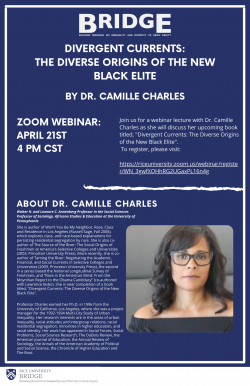 |
Divergent Currents: The Diverse Origins of the New Black EliteApril 21st, 2021 Professor Camille Charles earned her Ph.D. in 1996 from the University of California, Los Angeles, where she was a project manager for the 1992-1994 Multi-City Study of Urban Inequality. Her research interests are in the areas of urban inequality, racial attitudes and intergroup relations, racial residential segregation, minorities in higher education, and racial identity; her work has appeared in Social Forces, Social Problems, Social Science Research, The DuBois Review, the American Journal of Education, the Annual Review of Sociology, the Chronicle of Higher Education and The Root. |
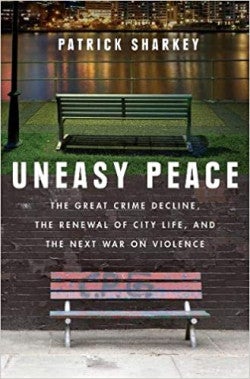 |
BRIDGE Lecture: Patrick SharkeyApril 7th, 2021 Over the past twenty-five years, American cities have transformed. Violence became less common in almost every city across the country, and it plummeted in many of our major urban centers. Sociologist Patrick Sharkey spent five years gathering national data to understand why it happened and how it changed urban inequality. In this webinar, Patrick Sharkey will discuss his most recent book Uneasy Peace: The Great Crime Decline, the Renewal of City Life, and the Next War on Violence and the ideas necessary to understand what shapes this shifting state of peace and how we might change the equation moving forward. |
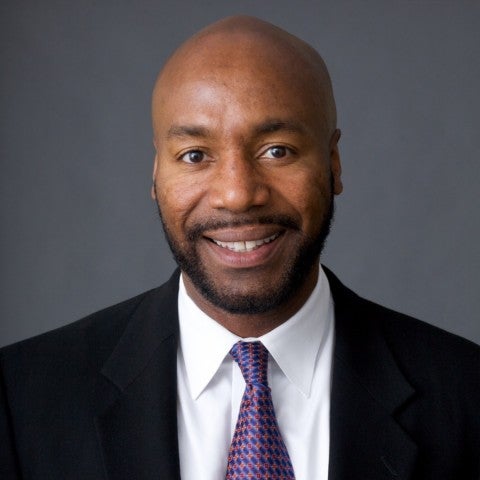 |
Prison Abolition, and a MuleNovember 10th, 2020 Paul Butler, the Albert Brick Professor in Law at Georgetown University Law Center and a legal analyst on MSNBC, will present, "Prison Abolition, and a Mule." Matthew Hayes, assistant professor of Political Science and a Center for African and African American Studies affiliated faculty member, will offer introductory remarks and Daniel Domingues, associate professor of History and the center's director of undergraduate studies, will moderate a Q&A. Sponsored by the Center for African and African American Studies, BRIDGE (Building Research on Inequality and Diversity to Grow Equity) and the Task Force on Slavery, Segregation and Racial Injustice, with support from the School of Humanities Dean’s Office. |
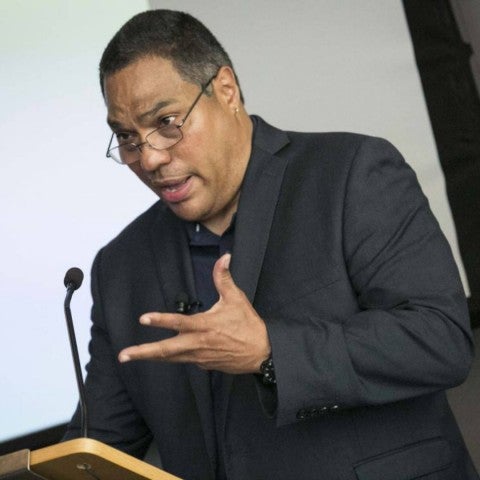 |
On "Systemic Racism"October 21st, 2020 In this talk, "What Makes 'Systemic Racism' Systemic?", Eduardo Bonilla-Silva, the James B. Duke Professor of Sociology at Duke University, will argue that racism is a structural feature of the United States. Jenifer Bratter, professor of Sociology at Rice, founding director of BRIDGE (Building Research on Inequality and Diversity to Grow Equity) and a member of the Center for African and African American Studies steering committee, will provide introductory remarks and Daniel Domingues, associate professor of History and the center's director of undergraduate studies, will moderate a Q&A. Sponsors: Center for African and African American Studies and BRIDGE. |
|
|
Restorative Justice ArchaeologySeptember 24th, 2020 Alicia Odewale, assistant professor of Anthropology, University of Tulsa, will present "Restorative Justice Archaeology: Unearthing the Aftermath of the Tulsa Race Massacre." Jeffrey Fleisher, associate professor of Anthropology, Rice, and a member of the Center for African and African American Studies steering committee, will provide introductory remarks and Daniel Domingues, associate professor of History and the center's director of undergraduate studies, will moderate a Q&A. Sponsors: Task Force on Slavery, Segregation and Racial Injustice, Center for African and African American Studies, BRIDGE (Building Research on Inequality and Diversity to Grow Equity). |
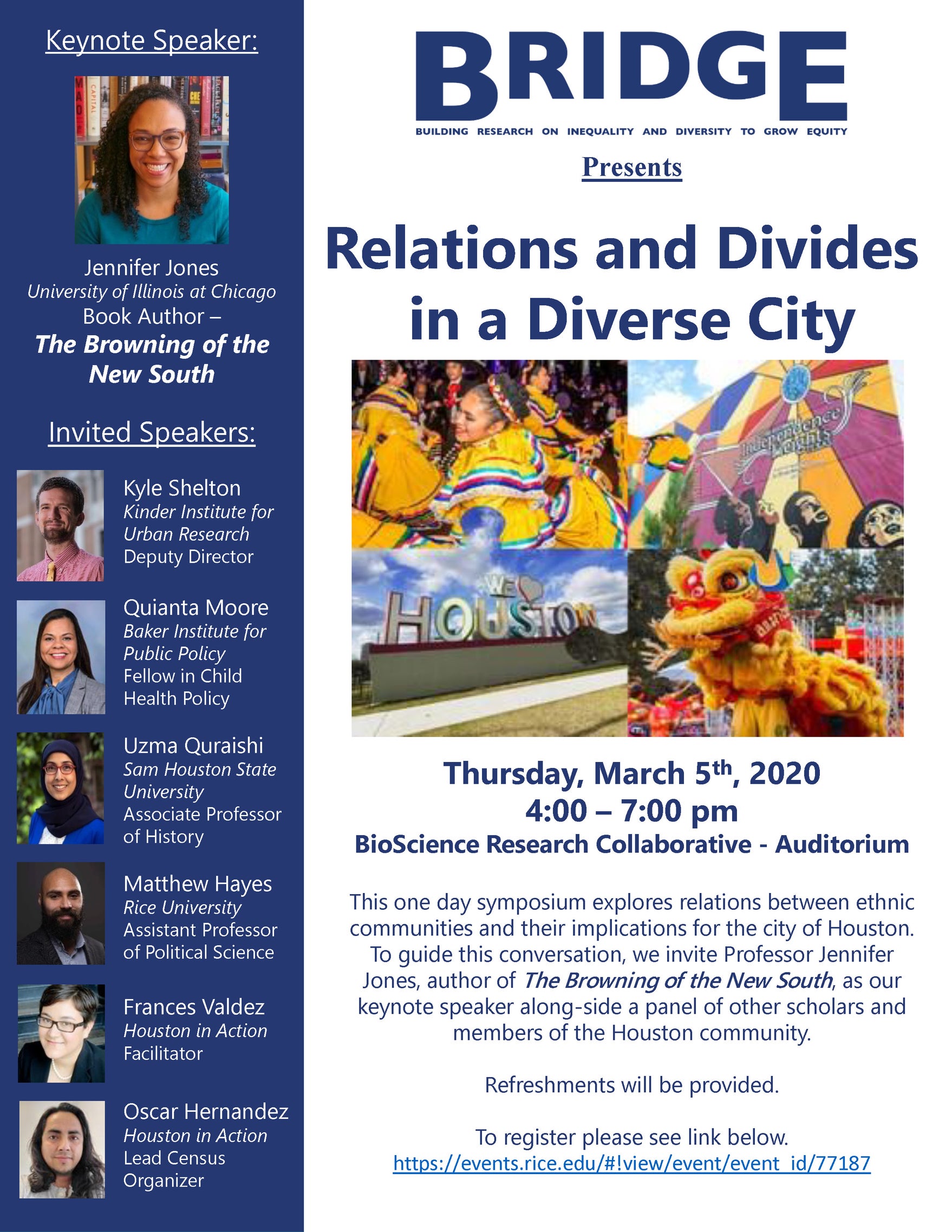 |
Relations and Divides in a Diverse CityMarch 5th, 2020 This one-day symposium explores relations between ethnic communities and their implications for the city of Houston. To guide this conversation, we invite Professor Jennifer Jones, author of The Browning of the New South, as our keynote speaker alongside a panel of other scholars and members of the Houston community. |

